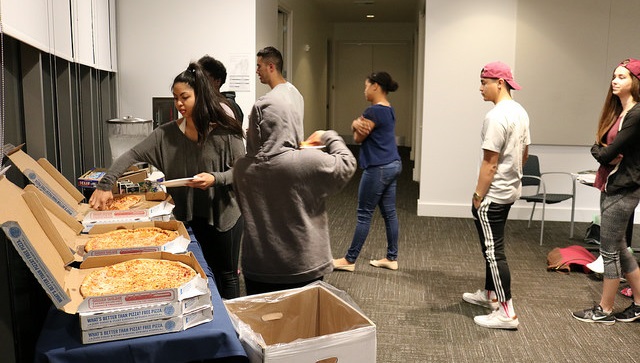Donuts, Dogs, and De-Stressing: Library Programs to Ease Student Stress
To help prepare their patrons for the long hours of studying, writing, and prepping, librarians have created anti-procrastination, stress-relieving events that seek to ease the pain of the finals push. We chatted with librarians from the United States, United Kingdom, and Canada about their specific programs, and the impact they have on students’ health and well-being during this tense time.
For most students, December is the most wonderful (read: stressful) time of the year. With final projects and exams nearing, students and librarians alike are gearing up for the anxiety-filled, coffee-fuelled days and nights ahead.
To help prepare their patrons for the long hours of studying, writing, and prepping, librarians have created anti-procrastination, stress-relieving events that seek to ease the pain of the finals push. We chatted with librarians from the United States, United Kingdom, and Canada about their specific programs, and the impact they have on students’ health and well-being during this tense time:
“Night of a Thousand Donuts,” Michigan State University Libraries; Michigan, US:
During the “Night of a Thousand Donuts,” the Michigan State University Library serves almost 2,000 donuts, 50 gallons of coffee, orange juice, and healthy snacks such as oranges and almonds at the Main Library and the Business Library. They place the food and drinks on book trucks and pass them around the building, as well as offer some in a conference room on the 4th floor of the library. This event takes about 30 librarians and staff to prepare, and is their most popular event; they give everything away in a little over an hour.
For this event, the librarians snap photos and put them on their three social media channels – Facebook, Twitter and Instagram – and the posts quickly become their most popular social media posts of the year. The program is offered to all students – around 50,000 individuals – every finals week (twice a year), thanks to a generous donation from Michigan State University Federal Credit Union.
Feedback on the program has been overwhelmingly positive:
“When we first started doing this, they asked us who we are and why we were doing this,” said Holly Flynn, Coordinator of Outreach and Engagement. “They seemed pretty amazed that librarians noticed them at all and wanted to help.”
For more information on this and other events the library offers, check out this blog post written by Holly Flynn.
“Dog De-Stress Day,” Staffordshire University Library; Stoke-on-Trent, UK:
 |
Image credit: “Michigan State University tweet”. Used with permission from Holly Flynn. |
In April each year, the Staffordshire University Library has regular dog days where guide dogs come in and let students spend time with them. They have a library dog called Willow, who does the same. Dog De-Stress Day is held twice a year on the Stoke-on-Trent campus to help students relax and unwind.
The program is offered to all current students, and runs for a total of six weeks. It benefits not only the students and dogs, but also the owners of the guide dogs, who enjoy sharing their furry companion with others.
In addition to this program, they also have a Children’s library with children’s books which the students are able to access for a moment of light-heartedness. This year, they are adding mindfulness books and games, and have linked up with the Sports Centre to offer physical well-being activities that will include activity boxes in the library with hula hoops and skipping ropes for students to use.
For more information about the “Dog De-Stress Day,” check out this article.
“Long Night Against Procrastination,” Loyola Marymount University; California, US:
On the night before the start of finals, the William H. Hannon Library at Loyola Marymount University hosts its “Long Night Against Procrastination” event. This event is a structured study session that encourages students to focus for an extended period of time to complete a project. The library publicizes the event across campus and reaches out to specific entities, such as the writing center, the honors program, and more, to get 50 to 60 students to sign up for the event.
It takes place on the third floor of the library from 8:00-pm to midnight. At the start of the event, students receive a goody bag and information about the schedule and resources available during the event. After pledging on a whiteboard what they hope to accomplish during the event, the students get to work.
 |
Image credit: “Long Night Against Procrastination Event.” Used with permission from the Loyola Marymount University Library. |
During the event, librarians and tutors are available to assist students with their projects if needed. Students take scheduled, structured breaks throughout the event, which include things such as a yoga stretch break, a few minutes of watching cute videos, and a group popping of bubble wrap. Pizza is also served halfway through the event.
The library has found “Long Night Against Procrastination” to be successful, with both a good turnout for the event and positive feedback from students afterwards. In addition to providing study resources, free food, and giveaways, the event provides an opportunity for co-studying with other students that encourages attendees to stay focused and be productive.
For more information on this program read this longer piece written by John Jackson, Head of Outreach & Communications at the William H. Hannon Library.
“Library De-stress Week,” University of Toronto; Toronto, Canada:
Library De-stress Week started at The University of Toronto Mississauga Library in December 2012. On average, they have 1,000 participants in events, which include therapy dog visits, mini-massage appointments, board games, video games, henna tattoos, as well as various creative arts and crafts projects (scratch arts, DIY gift bags, and more).
Nelly Cancilla, the Communications and Liaison Librarian, helps promote the program alongside the Library Ambassadors who are responsible for running the events, under direction from the Library Community Development Leader Donna Liu. Nelly said that the events are highly effective for relieving stress, and students look forward to the events as a way to break up their studying with entertaining and positive activities. The team see their role in the library as supporting the needs of the community, and student stress and mental health is an issue that they see as a priority, particularly during the exam period.
Explore their full calendar of de-stress events on their website.
This post originally appeared on the OUPblog
This post was written by the OUPLibraries social media group and collated by Katie Bennett, who is a Marketing Assistant at Oxford University Press.
RELATED
ALREADY A SUBSCRIBER? LOG IN
We are currently offering this content for free. Sign up now to activate your personal profile, where you can save articles for future viewing










Add Comment :-
Comment Policy:
Comment should not be empty !!!